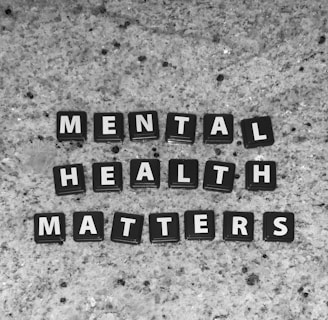The Hidden Toll of Global Uncertainty on Your Mental Health (And How to Fight Back)
Discover how global crises like war, climate change, and economic instability are silently impacting your mental health. Learn science-backed tips—like breathwork, mindfulness, and movement—to reduce anxiety, improve sleep, and build emotional resilience.
5/10/20252 min read


Feeling overwhelmed by global conflict, climate change, and constant bad news? Learn how global uncertainty impacts mental health and discover calming exercises to protect your well-being.
Is the World Getting Heavier, or Is It Just Your Mind?
Every day seems to bring a fresh crisis—another war, a financial shake-up, extreme weather events, or unsettling political shifts. The 24/7 news cycle doesn't let us look away, and as a result, many of us are living in a constant state of low-grade anxiety.
You’re not alone. Mental health experts are seeing a clear spike in stress-related symptoms like insomnia, burnout, panic attacks, and emotional fatigue. This isn’t just in your head—it’s a global phenomenon tied to what’s often called “eco-anxiety,” “doom scrolling fatigue,” and “conflict burnout.”
Let’s break down how global uncertainty is silently draining your mental health—and more importantly, how you can take back control.
Why Global Events Are Impacting Your Mental Health
When your brain constantly receives signals of danger—even if the threat isn’t direct—it kicks into fight-or-flight mode. This was helpful when humans needed to escape predators, but now? That same stress response is activated every time you scroll past a troubling headline.
Here’s what that looks like in everyday life:
Racing thoughts and intrusive worries
Difficulty sleeping or restless nights
Emotional numbness or irritability
Feeling overwhelmed even by small tasks
What makes this worse is the feeling of helplessness. When the problems are so big—climate change, geopolitical tension, or economic downturn—it’s easy to feel like there’s nothing you can do.
Let’s Flip the Script: 5 Grounding Habits That Help You Reclaim Peace
Here’s the good news: While you can’t change the world overnight, you can change how your nervous system responds to it. Small, consistent actions can help reduce stress and improve resilience.
🧘 1. Start Your Day With 3 Minutes of Breathwork
Try this simple technique: inhale for 4 seconds, hold for 4, exhale for 6. Do this for 3 minutes in the morning. It resets your stress baseline and anchors you in the present.
🏃 2. Move Your Body—Even If It's Just a 10-Minute Walk
Exercise is one of the most effective stress relievers. Even light movement boosts serotonin and clears cortisol (the stress hormone) from your system.
📵 3. Take a “News Fast”
Set a boundary around your media consumption. Try checking news just once or twice a day, and never right before bed. Trust us—your brain will thank you.
🧠 4. Try the “Name It to Tame It” Technique
When you’re spiraling, pause and name your emotion. “I’m feeling anxious.” This small action activates the logical part of your brain and helps regulate big emotions.
🌿 5. Reconnect With Nature
Even five minutes outside in natural light can improve your mood. If you can’t get outdoors, listen to calming nature sounds. It signals safety to your nervous system.
You're Not Powerless—You're Human
It’s okay to feel overwhelmed. You don’t need to carry the weight of the world alone. What matters is that you take care of your mind in a way that’s gentle, intentional, and grounded in reality.
Start with one small habit today. Then tomorrow, do it again. Over time, these micro-changes become mental armor against global chaos.
Takeaway Tip:
When the world feels out of control, your breath, your body, and your boundaries are still yours to own. Start there.
Looking for more tools to stay grounded?
Subscribe to Velvet Monogram’s newsletter for weekly wellness tips, guided audio meditations, and more ways to live mindfully—even in uncertain times.
